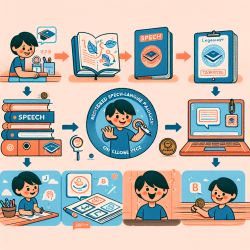As speech-language pathologists (SLPs), our ultimate goal is to create the best possible outcomes for the children we serve. To achieve this, it is essential to rely on data-driven decisions and evidence-based practices. A recent issue of the Canadian Journal of Speech-Language Pathology and Audiology / Revue canadienne d'orthophonie et d'audiologie offers valuable insights into how we can improve our skills and interventions by implementing research findings or by encouraging further research. In this blog, we will explore some key articles from Volume 36, No. 2 (Summer 2012) and discuss how their findings can be applied to enhance our practice.
Ethical Dilemmas in Audiology and Hearing Aid Use
One notable article, "Ethical Dilemmas: Are Audiologists and Hearing Aid Users on the Same Side?" by James Coolen, Rachel Caissie, and Steve Aiken, examines the ethical issues surrounding the provision of hearing aids and interactions with manufacturers. The study highlights that hearing aid users often perceive ethical dilemmas more critically than audiologists. This discrepancy suggests that SLPs and audiologists should be more transparent with patients and consider their perspectives when making clinical decisions. By fostering an open dialogue about potential conflicts of interest, we can build trust and ensure that our recommendations align with the best interests of our patients.
Listener Reactions to Pseudostuttering Experiences
Another insightful article, "Listener Reactions to Pseudostuttering Experiences" by Farzan Irani and Alisha S. Richmond, investigates how listeners respond to pseudostuttering behaviors. The study found that listeners were generally patient but often confused, particularly during initial interactions. This research underscores the importance of educating the public about stuttering to reduce negative stereotypes and improve social interactions for individuals who stutter. SLPs can use these findings to develop community outreach programs and workshops that increase awareness and understanding of stuttering, ultimately creating a more supportive environment for children who stutter.
Public Attitudes Toward Stuttering: Online Versus Paper Surveys
In "POSHAS Public Attitudes Toward Stuttering: Online Versus Paper Surveys," Kenneth O. St. Louis compares public attitudes toward stuttering collected through online and paper surveys. The study reveals that both methods yield similar results, suggesting that online surveys can be a viable option for gathering data on public perceptions. This finding is particularly relevant for SLPs conducting research or surveys in school settings, as online methods can save time and resources while still providing reliable data. By leveraging technology, we can efficiently collect valuable information that informs our practice and advocacy efforts.
Normative Values for Competing Speech Tests
The article "Étude des valeurs normatives des tests d'écoute de parole en compétition auprès d'enfants d'âge scolaire francophones" by Benoît Jutras et al. focuses on establishing normative values for competing speech tests in French-speaking school-aged children. This research provides essential benchmarks for assessing auditory processing disorders (APD) in this population. SLPs working with French-speaking children can use these normative values to more accurately diagnose and tailor interventions for APD, ensuring that assessments are culturally and linguistically appropriate.
The Effect of Chin Down Position on Penetration-Aspiration
Stephen Fraser and Catriona M. Steele's study, "The Effect of Chin Down Position on Penetration-Aspiration in Adults with Dysphagia," examines the effectiveness of the chin-down maneuver in preventing aspiration. While this study focuses on adults, its findings can inform pediatric dysphagia management. The research highlights that the chin-down position may not always be beneficial and can sometimes worsen swallowing safety. SLPs should, therefore, use videofluoroscopic evidence to determine the appropriateness of this maneuver for each child, ensuring that interventions are both safe and effective.
FM Benefit Counseling Tool (FM-BCT)
Lastly, "The FM Benefit Counseling Tool (FM-BCT): Initial Stages of the Development of a Tool for Assessing the Benefit of FM Amplification from the Perspective of Adult Cochlear Implant Users" by Philippe Fournier et al. introduces a new tool for evaluating the benefits of FM systems. Although the study focuses on adults, the FM-BCT can be adapted for use with children who have cochlear implants. By systematically assessing the perceived benefits and factors influencing FM system use, SLPs can provide more personalized recommendations and improve communication outcomes for children with hearing loss.
Conclusion
By integrating findings from the latest research into our clinical practice, we can enhance our skills and create better outcomes for the children we serve. The articles from the Canadian Journal of Speech-Language Pathology and Audiology / Revue canadienne d'orthophonie et d'audiologie offer valuable insights that can guide our interventions and encourage further research. As SLPs, we must remain committed to data-driven decisions and evidence-based practices to ensure that our work is both effective and ethical.
To read the original research papers, please follow this link: Canadian Journal of Speech-Language Pathology and Audiology / Revue canadienne d'orthophonie et d'audiologie.










